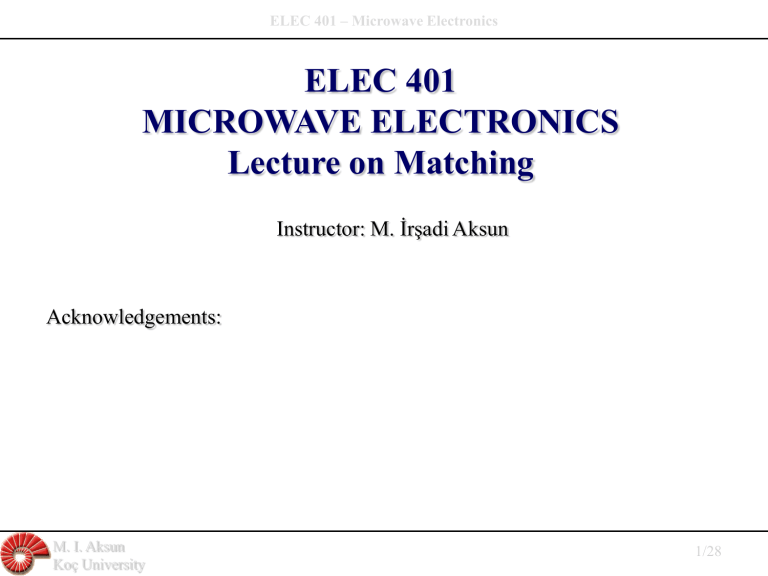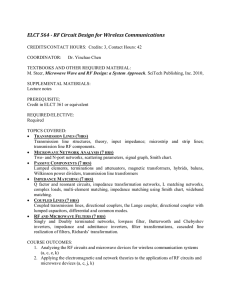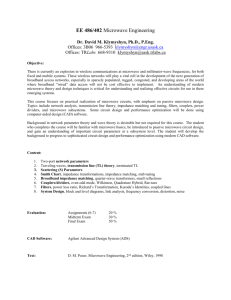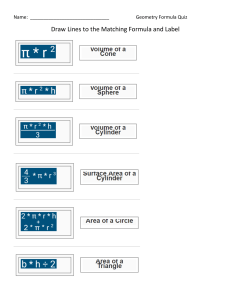
ELEC 401 – Microwave Electronics ELEC 401 MICROWAVE ELECTRONICS Lecture on Matching Instructor: M. İrşadi Aksun Acknowledgements: M. I. Aksun Koç University 1/28 ELEC 401 – Microwave Electronics Outline Chapter 1: Motivation & Introduction Chapter 2: Review of EM Wave Theory Chapter 3: Plane Electromagnetic Waves Chapter 4: Transmission Lines & Smith Chart Chapter 5: Microwave Network Characterization Chapter 6: Impedance Matching Chapter 7: Passive Microwave Components M. I. Aksun Koç University 2/28 ELEC 401 – Microwave Electronics Impedance Matching Impedance matching or tuning is important, because it helps to transfer maximum power to the network or load; improve the signal-to-noise ratio of the system Z0 Matching Network Load Matching networks are ideally lossless, and it is always possible to design such a matching network if the load has some non-zero real part M. I. Aksun Koç University 3/28 ELEC 401 – Microwave Electronics Impedance Matching I. Matching with lumped elements (L Networks): L section uses two reactive elements to match an arbitrary load impedance to a TL; There are two possible configurations; jX jX Z0 jB ZL Z L is inside the 1+jX circle on the SC M. I. Aksun Koç University Z0 jB ZL Z L is outside the 1+jX circle on the SC 4/28 ELEC 401 – Microwave Electronics Impedance Matching jX Z0 jB ZL Z L is outside the 1+jX circle on the SC jX 1 jX Z0 jB ZL Z L is inside the 1+jX circle on the SC M. I. Aksun Koç University 5/28 ELEC 401 – Microwave Electronics Impedance Matching Comments on the use of lumped elements: Actual lumped element capacitors and inductors can be used up to several GHz. However, there is a large range of frequencies and circuit sizes where lumped elements cannot be realized. This is considered to be the major limitation of the L-Section matching network. M. I. Aksun Koç University 6/28 ELEC 401 – Microwave Electronics Impedance Matching Frequency response of a real lumped inductor: M. I. Aksun Koç University 7/28 ELEC 401 – Microwave Electronics Impedance Matching Frequency response of a real lumped capacitor: M. I. Aksun Koç University 8/28 ELEC 401 – Microwave Electronics Impedance Matching Realization of inductors and capacitors from TL sections A small section of high impedance line is equivalent to a series inductance: Z 01 Z0 Z 02 Z L Z 02 Z jZ0 tan l Z jZ0l Z 0 Z L Z in Z 0 L Z0 L Z L jZ0l Z 0 jZ L tan l Z 0 jZ Ll Z l Z in Z L j 0 Z L jL v M. I. Aksun Koç University 9/28 ELEC 401 – Microwave Electronics Impedance Matching Realization of inductors and capacitors from TL sections A small section of low impedance line is equivalent to a shunt capacitance: Z 01 Z0 Z 02 YL Y02 Y jY0 tan l Y jY0l Y0 YL Yin Y0 L Y0 L YL jY0l Y0 jYL tan l Y0 jYLl Yl Yin YL j 0 YL jC v M. I. Aksun Koç University 10/28 ELEC 401 – Microwave Electronics Impedance Matching Example: Design an L section matching network to match a load ZL=(100-j50)W to a 50 W line at 1.0 GHz. Z L 2 j1 is inside the 1+jX circle jX Z0 jB ZL Y1 YL jB YL 0.4 j 0.2 M. I. Aksun Koç University ZL 11/28 ELEC 401 – Microwave Electronics Impedance Matching 1. Z L 2 j1 YL 0.4 j 0.2 21. Y1 YL j 0.3 Z1 1 j1.2 3. Z in Z1 j1.2 1.0 j 0.3 4. B 0.3; X 1.2 YL jX Z0 Z2 Y1 jB ZL ZL Y1 YL jB YL 0.4 j 0.2 Y2 Z1 22. Y2 YL j 0.7 Z 2 1 j1.2 3. Z in Z 2 j1.2 1.0 4. B 0.7; X 1.2 M. I. Aksun Koç University 12/28 ELEC 401 – Microwave Electronics Impedance Matching B 6 10 3 3 Capacitive 3 B 0.3 B 6 10 / W B C C pF 50 2 1109 60 30 Inductive nH X 1.2 X X 50 60W X L L 9 2 110 jX Z0 jB ZL Y1 YL jB YL 0.4 j 0.2 B 1 50 L H 9 L 0.7 2 110 X 1.2 X X 50 60W X 1 1 C F 9 C 60 2 110 0.7 Inductive B 0.7 B / W 50 Capacitive M. I. Aksun Koç University 13/28 ELEC 401 – Microwave Electronics Impedance Matching II. Single Stub matching Yin Ys Y0 Y0 ZL Y Y0 Open Circuit or Short Circuit d l In single stub tuning, the two adjustable parameters are the distance d from the load to the stub position, and the length of the stub l. M. I. Aksun Koç University 14/28 ELEC 401 – Microwave Electronics Impedance Matching The basic idea is to select d so that Y Y0 jB, and jB jB to find the length of the stub l such that Ys jB, hence Yin Y 0 Y Yin M. I. Aksun Koç University Y0 ZL Y Y0 Open Circuit or Short Circuit d Ys Y0 Ys l 15/28 ELEC 401 – Microwave Electronics Impedance Matching Example: Design two single-stub shunt tuning networks to match Z L (15 j10)W to a 50W line. Solution: - There are two approaches to solve such a problem; using Smith Chart and using analytical expressions of TL. - Solution with Smith Chart is more intuitive, and easier than solving the problem analytically. Yin Ys Y0 M. I. Aksun Koç University Y0 ZL Y Y0 Open Circuit or Short Circuit d l 16/28 ELEC 401 – Microwave Electronics Impedance Matching Solution via Smith Chart: Z (15 j10) i) Z L L 0.3 j 0.2 Z0 50 ii) Draw the corresponding SWR circle or constant G circle. iii) YL 2.2 j1.5 Note that the SWR circle intersects the 1+jb circle at two points. Y2 ZL YL d1 0.042 d2 0.385 Yin Ys Y0 Y0 ZL Y1 Y Y0 Open Circuit or Short Circuit d l M. I. Aksun Koç University 17/28 ELEC 401 – Microwave Electronics Impedance Matching iv) Y1 1.0 j1.33 Y2 1.0 j1.33 Ys j1.33 v) The first tuning solution requires a stub with Ys j1.33 vi) The length of an opencircuited stub that gives this susceptance can be found on the SC by starting at Y 0 (open circuit ) l1 0.147 l2 0.353 Yin d Ys Y0 Y Y0 Open Circuit Y 0 Y0 ZL Ys j1.33 l M. I. Aksun Koç University 18/28 ELEC 401 – Microwave Electronics Impedance Matching 0 Z Open Circuit Zin (75 j90)W Z L 60 j 45W Ys 75 W Zin (75 j90)W Z 0 75W Z 0 75W Z 0 75W d Z L 60 j 45W Example: For a load impedance of ZL=(60-j45)Ω, design two single-stub matching networks that transform the load to a Zin=(75+j90)Ω input impedance. Assume that both stub and transmission line shown below have a chracteristic impedance of Z0=75Ω. l Microstrip realization M. I. Aksun Koç University 19/28 ELEC 401 – Microwave Electronics d j 0.45 Ys1 Zin (75 j90)W Z 0 75W Z in W 75 Z 0 YL Ys Open Circuit l j1.6 Ys 2 ZL Yin ZL 60 j 45 0.8 j 0.6 75 75 j 90 1.0 j1.2 75 YL 0.8 j 0.6 Z in Ys1 j 0.45 M. I. Aksun Koç University Ys 2 j1.6 20/28 Z L 60 j 45W Impedance Matching ELEC 401 – Microwave Electronics Impedance Matching d YL Ys1 Zin (75 j90)W Z 0 75W YL Open Circuit Yin Y L Ys 2 Z0 Ys W 75 l YL Ys1 Yin YL Ys 2 Yin M. I. Aksun Koç University d2=(0.416-0.35)=0.066 21/28 Z L 60 j 45W Find the length d of the TL; ELEC 401 – Microwave Electronics Impedance Matching d Zin (75 j90)W l1=0.067 Z 0 75W Open Circuit Y 0 Z0 Ys W 75 Z L 60 j 45W Find the length l of the stub; Ys1 j 0.45 l Starting from the opencircuit Y 0, one can move towards generator to reach Ys1 j 0.45 Ys1 j1.6 M. I. Aksun Koç University Ys 2 j1.6 22/28 ELEC 401 – Microwave Electronics Impedance Matching II. Double-Stub matching YB YA Yin YC d Y0 jB2 Y0 O.C or S.C. l2 jB1 Y0 Y0 O.C or S.C. Y0 YL Y l1 In double-stub tuning, the two adjustable parameters are the lengths of the stubs, l1 and l2. Note that the distance between the two stubs d is usually set to a fixed value /8 or 3/8. M. I. Aksun Koç University 23/28 ELEC 401 – Microwave Electronics Impedance Matching The operation of this tuner: i. For a perfect match Yin 1 YC 1 jB2 . YC point must be located on the G 1 circle. YB YA Yin YC d G 1 Circle Y0 jB2 Y0 Yin 1 M. I. Aksun Koç University O.C or S.C. l2 jB1 Y0 Y0 O.C or S.C. Y0 YL Y l1 24/28 ELEC 401 – Microwave Electronics Impedance Matching The operation of this tuner: ii. YB point must lie on the rotated G 1 circle YB YA Yin YC d Y0 jB2 Y0 Yin 1 Forbidden Region O.C or S.C. G 1 circle l2 jB1 Y0 Y0 O.C or S.C. YL Y0 Y l1 is rotated towards load by the distance d. YB YA jB1. M. I. Aksun Koç University 25/28 ELEC 401 – Microwave Electronics • Design of a double-stub matching network It is assumed that in the double-stub matching network seen below, the lengths of the TLs are l1=λ/8 and l3=l2=3λ/8. Find the lengths of the short circuited stubs that match the load impedance ZL=(50+j50)Ω to a 50Ω input impedance. The chracteristic line impedance for all components is Z0=50Ω M. I. Aksun Koç University 26/28 ELEC 401 – Microwave Electronics Z L 1 j1W YD 0.4 j 0.2S 0.125 Z D 2 j1W M. I. Aksun Koç University 27/28 ELEC 401 – Microwave Electronics 3 / 8 towards load MAKE SURE THAT YD IS NOT INSIDE THE FORBIDDEN REGION YB 1 j3S The difference between YD and YC is: YD YC j 2 S jBS1 j 2S YD 0.4 j 0.2S jX S1 j 0.5W YA 1S Forbidden Region Therefore the length of first stub is lS1 = 0.074λ. The difference between YB and YA is: 3 / 8 towards generator YC 0.4 j1.8S YB YA j3S jBS1 j 3S jX S1 j 0.33W M. I. Aksun Koç University Therefore the length of second stub is lS2 =28/28 0.051λ.


